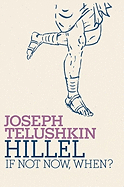
 Though he's one of the great sages of the Jewish people, save for an often misquoted aphorism or two, Hillel's true significance is a mystery to many Jews and members of other faiths. In this brief but rich intellectual biography addressed to a non-scholarly audience, Rabbi Joseph Telushkin attempts to fill that gap, offering a thoughtful exploration of this remarkable rabbi's teachings.
Though he's one of the great sages of the Jewish people, save for an often misquoted aphorism or two, Hillel's true significance is a mystery to many Jews and members of other faiths. In this brief but rich intellectual biography addressed to a non-scholarly audience, Rabbi Joseph Telushkin attempts to fill that gap, offering a thoughtful exploration of this remarkable rabbi's teachings.
Born in Babylonia, Hillel flourished in the period from 30 B.C.E. to 10 C.E., during the reign of King Herod in Jerusalem. Telushkin concedes there is scant evidence out of which to construct a conventional biography, so he focuses on stories about Hillel and reports of his legal rulings appearing in the Talmud and other commentaries on the Torah. These accounts reveal a patient, humble man (he earned a living as a woodchopper), capable of both an intellectually rigorous and flexible approach to vexing issues of Jewish law.
During the period of his teaching, Hillel's rival and foil was Shammai, another religious leader who, along with his disciples, inclined toward a literal interpretation of the Torah's laws. Illustrative of the philosophical gulf separating the two schools is the tale of a man who requested conversion, and Shammai responded with a brandished stick. The same man asked Hillel to convert him--on the condition that he instruct him on the entire Torah "while I stand on one foot." "That which is hateful to you, do not to do your fellow," Hillel replied. "All the rest is commentary. Now go and study."
This arresting story serves as the foundation for one of Telushkin's central themes: a passionate argument that Judaism should reexamine what he contends is an attitude of hostility at worst, and skepticism at best, toward converts. When one considers the rate at which the Jewish population of the United States is shrinking (currently less than 2% of the total population, with a 40% intermarriage rate), Telushkin's case is persuasive, even compelling, to those concerned about the survival of the Jewish people.
Telushkin concisely covers a broad range of other topics, including the centrality of ethical behavior in Hillel's thought (more important than ritual observance, in his view), while offering a provocative discussion comparing the teachings of Hillel and Jesus, whose lives overlapped for a time. For those inspired to follow Hillel's dictum to "go and study," this exemplary work, which includes a helpful glossary, an extensive section of notes and a useful bibliography, is an ideal place to start.--Harvey Freedenberg
Shelf Talker: Rabbi Joseph Telushkin's biography of Hillel is a stimulating examination of the thought and influence of the great Jewish sage.

